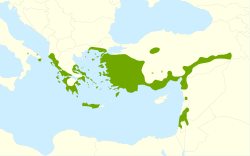Biology:Quercus ithaburensis
| Quercus ithaburensis | |
|---|---|

| |
| Scientific classification | |
| Kingdom: | Plantae |
| Clade: | Tracheophytes |
| Clade: | Angiosperms |
| Clade: | Eudicots |
| Clade: | Rosids |
| Order: | Fagales |
| Family: | Fagaceae |
| Genus: | Quercus |
| Subgenus: | Quercus subg. Cerris |
| Section: | Quercus sect. Cerris |
| Species: | Q. ithaburensis
|
| Binomial name | |
| Quercus ithaburensis Decne.
| |

| |
| Distribution map | |
| Synonyms[2] | |
|
Of the species:[2]
Of subsp. macrolepis:[3]
| |
Quercus ithaburensis, the Mount Tabor oak, is a tree in the beech family Fagaceae. It is found from southeastern Italy to the Palestine region.[2] It is the national tree of Jordan.[4] Two subspecies are accepted, Quercus ithaburensis subsp. ithaburensis and Quercus ithaburensis subsp. macrolepis (syn. Quercus macrolepis, the Valonia oak).[2] Together with Quercus brantii, it forms a clade of distinct, closely related species within the oak section Cerris.[5]
Description
Quercus ithaburensis is a small to medium-sized semi-evergreen to tardily deciduous tree growing to a maximum height of around 15 metres (49 feet) with a rounded crown and often with a gnarled trunk and branches. The leaves are 4–9 centimetres (1 1⁄2–3 1⁄2 inches) long and 2–5 cm wide, oval in shape, with 7 to 10 pairs of either teeth (most common) or shallow lobes (rare) along a revolute margin. They are dark glossy green above and gray tomentose below.[6][7]
The male flowers are light green 5-cm long catkins while the wind-pollinated female flowers are small, up to 0.4 millimetres (1⁄32 in), produced in threes on short stalks called peduncles. Flowering occurs from March through April in most of its native range. The acorns are generally oval, up to 5 cm long and 3 cm wide with a cap covering roughly one-third of the acorn, maturing in 18 months, dropping from the tree in the second autumn after pollination. The cap is covered in long stiff loose scales which are rolled backwards or involute, especially along the edges of the cap.[6][7][8]
Taxonomy
Two subspecies are accepted:[2]
- Quercus ithaburensis subsp. ithaburensis – Turkey to the Palestine region[9]
- Quercus ithaburensis subsp. macrolepis (Kotschy) Hedge & Yalt., syn. Quercus macrolepis, the Valonia oak[10] – throughout the range of the species except the Palestine region[3]
Distribution and habitat
Quercus ithaburensis is native from the central and east Mediterranean basin. This oak grows in southeastern Italy, South Albania, coast areas and islands of Greece, South and West Turkey, Syria, Lebanon, Israel and Jordan.[1]
Before the 20th century, the Plain of Sharon was covered by open woodland dominated by Quercus ithaburensis, which extended from Kfar Yona in the north to Ra’ananna in the south. The local Arab inhabitants traditionally used the area for pasture, firewood and intermittent cultivation. The intensification of settlement and agriculture in the coastal plain during the 19th century led to deforestation and subsequent environmental degradation known from Hebrew sources.[11]
Uses
The cups of Quercus ithaburensis subsp. macrolepis, known as valonia, are used for tanning and dyeing as are the unripe acorns called camata or camatina. The ripe acorns are eaten raw or boiled.[12]
See also
References
- ↑ 1.0 1.1 Gorener, V.; Jerome, D. (2018). "Quercus ithaburensis". IUCN Red List of Threatened Species 2018: e.T194178A2303017. doi:10.2305/IUCN.UK.2018-1.RLTS.T194178A2303017.en. https://www.iucnredlist.org/species/194178/2303017. Retrieved 26 December 2022.
- ↑ 2.0 2.1 2.2 2.3 2.4 "Quercus ithaburensis Decne..". Plants of the World Online. Royal Botanic Gardens, Kew. http://www.plantsoftheworldonline.org/taxon/urn:lsid:ipni.org:names:296316-1.
- ↑ 3.0 3.1 "Quercus ithaburensis subsp. macrolepis (Kotschy) Hedge & Yalt..". Plants of the World Online. Royal Botanic Gardens, Kew. http://www.plantsoftheworldonline.org/taxon/urn:lsid:ipni.org:names:920259-1.
- ↑ Mouterde, Paul 1966. Nouvelle Flore du Liban et de la Syrie 1: 365
- ↑ "Vallonea or Aegilops Oaks, a Short Review" (in en). 2016-06-04. https://www.internationaloaksociety.org/content/vallonea-or-aegilops-oaks-short-review.
- ↑ 6.0 6.1 Oaks of the World: Quercus ithaburensis
- ↑ 7.0 7.1 Wild Flowers of Israel: Quercus ithaburensis
- ↑ Menitsky, Yu.L. (2005). Oaks of Asia. Science Publishers ISBN:1-57808-229-3.
- ↑ "Quercus ithaburensis subsp. ithaburensis". Plants of the World Online. Royal Botanic Gardens, Kew. http://www.plantsoftheworldonline.org/taxon/urn:lsid:ipni.org:names:77172217-1.
- ↑ Society for Valonia Oak website
- ↑ Marom, Roy (2022-12-01). "יער השרון (אל-ע'אבה) בתקופה העות'מאנית: בתקופה מהמחקר חדשות תובנות הגיאוגרפי-היסטורי The Oak Forest of the Sharon (al-Ghaba) in the Ottoman Period: New Insights from Historical- Geographical Studies". Muse 5: 90–107. https://www.academia.edu/93207554/%D7%99%D7%A2%D7%A8_%D7%94%D7%A9%D7%A8%D7%95%D7%9F_%D7%90%D7%9C_%D7%A2%D7%90%D7%91%D7%94_%D7%91%D7%AA%D7%A7%D7%95%D7%A4%D7%94_%D7%94%D7%A2%D7%95%D7%AA%D7%9E%D7%90%D7%A0%D7%99%D7%AA_%D7%91%D7%AA%D7%A7%D7%95%D7%A4%D7%94_%D7%9E%D7%94%D7%9E%D7%97%D7%A7%D7%A8_%D7%97%D7%93%D7%A9%D7%95%D7%AA_%D7%AA%D7%95%D7%91%D7%A0%D7%95%D7%AA_%D7%94%D7%92%D7%99%D7%90%D7%95%D7%92%D7%A8%D7%A4%D7%99_%D7%94%D7%99%D7%A1%D7%98%D7%95%D7%A8%D7%99_The_Oak_Forest_of_the_Sharon_al_Ghaba_in_the_Ottoman_Period_New_Insights_from_Historical_Geographical_Studies.
- ↑ Qercus aegilops on food.oregonstate.edu
External links
Wikidata ☰ {{{from}}} entry
 |



